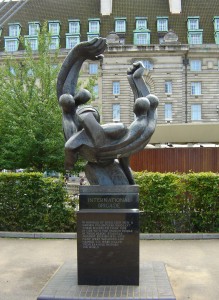British allies: Keeping history alive
Editor’s Note: When the Veterans of the Abraham Lincoln Brigade established ALBA as a non-profit educational organization in 1979 to keep alive traditions of anti-fascism and human rights, they hadn’t guessed that the U.S. organization would eventually become a model for their British comrades. The International Brigades Memorial Trust (IBMT), sharing a common mission with ALBA, has emerged as a vital, growing organization. We asked the current leader, Jim Jump, a journalist living in London, for a report of their latest activities.
There were mixed feelings at the end of last year among those of us dedicated to preserving the memory of the 2,500 International Brigade volunteers from Britain and Ireland. On the one hand we celebrated the fact that the International Brigade Memorial Trust now has over 900 paying members. This is a record figure, our organization having tripled in size over the past five years. But a shadow was cast over this achievement by the death on December 21 of our last British-based veteran, David Lomon.
We received many messages of condolence following David’s death. One stood out. It said that the work of the IBMT was now even more important than before. The absence of any veterans certainly makes our task seem that much harder. But this is the challenge they have left us, and one that we are determined to meet.
The IBMT was founded in 2001 after the remaining 40 veterans in the International Brigade Association agreed to join forces with their sister group, the Friends of the International Brigades. At the outset there were barely 170 on the membership roll. We were in good hands, however. Our president was the legendary union leader Jack Jones, a former Liverpool docker who fought in the Battle of the Ebro. And we had two influential patrons: Spanish Civil War historian Paul Preston, who chaired our inaugural meeting, and Ken Livingstone, the mayor of London who helped raise the impressive memorial to the international Brigades next to the Thames.
Our gathering each July at the London memorial now attracts several hundred people. Every March we have a public lecture—the 2013 topic was George Orwell’s Homage to Catalonia and nearly 200 people attended the conference in Manchester. Our annual general meeting in October—this year in Edinburgh—brings members together for a weekend of talks, music and film.
Last year we co-hosted a concert to mark the 75th anniversary of the bombing of Guernica, and we organized a commemorative crossing of the Pyrenees; this year we’ll be in Spain to honor the last stand of the British Battalion in September 1938, and later in the year there will be a gala evening in London to mark the return of the British Battalion in December 1938. Meanwhile, new memorials to the volunteers—526 of whom died in Spain—are still being unveiled, adding to the more than 100 existing memorials in the British Isles.
Our aims are clear. We must make sure we meet the expectations of the hundreds of supporters who have joined us in recent years. And we owe it to the volunteers themselves to build a sustainable organization so that future generations can be told the extraordinary story of the men and women who went to Spain prepared to give their lives in the fight against fascism.
For more information, see: www.international-brigades.org.uk













